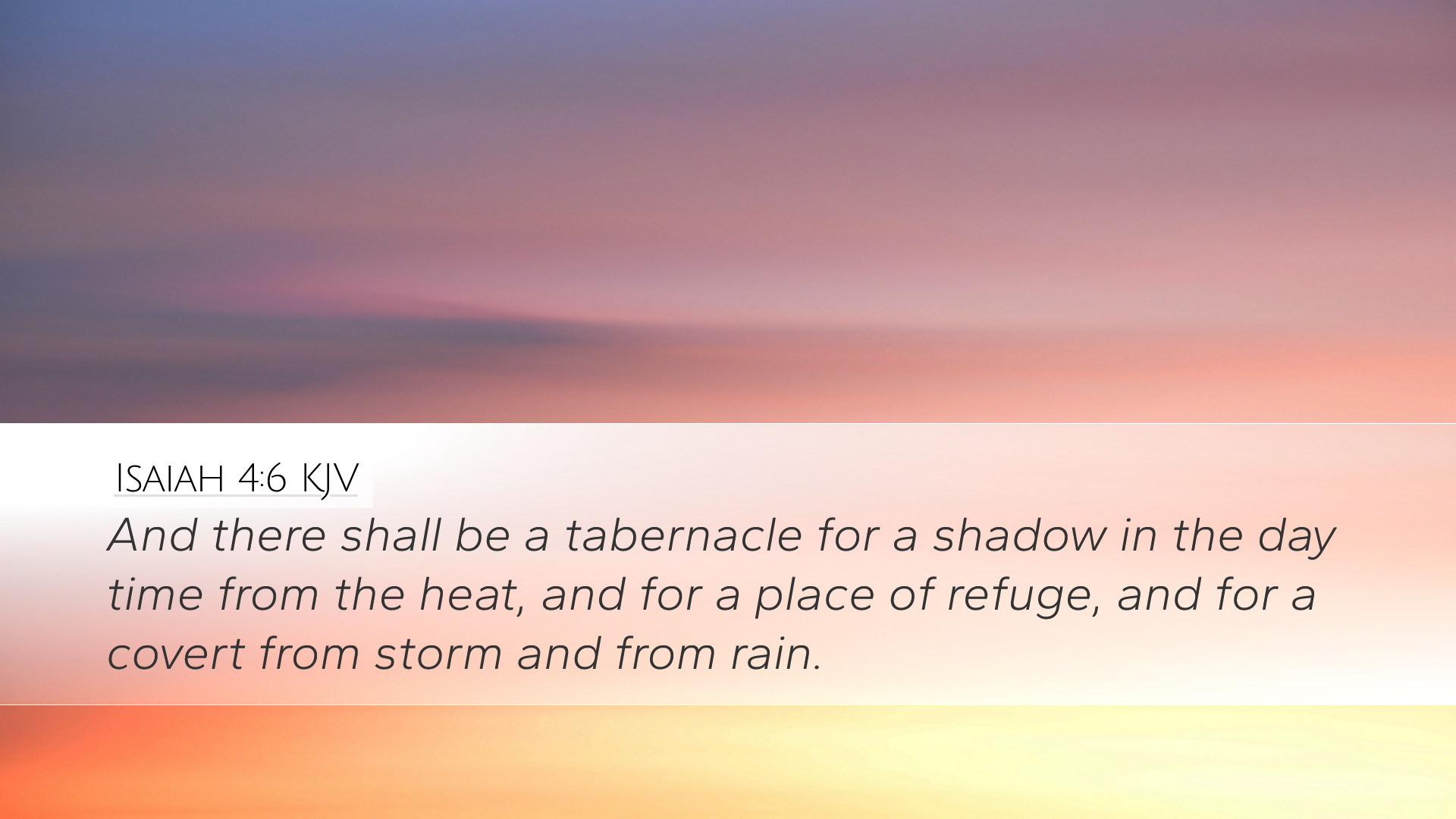Commentary on Isaiah 4:6
Isaiah 4:6 states: "And there shall be a tabernacle for a shadow in the day time from the heat, and for a place of refuge, and for a covert from storm and from rain." This verse encapsulates a profound promise of protection and divine presence, serving as a mystical insight into God's relationship with His people.
Introduction
The Book of Isaiah, a prophetic text, addresses the complexity of Israel's social, political, and spiritual environments. This particular verse is located within a section that speaks to the future hope of restoration and divine security. Various public domain commentaries provide insights on the implications of "tabernacle," "shadow," and the overall theme of refuge.
Contextual Analysis
To understand the significance of Isaiah 4:6, it is essential to examine its context within the surrounding verses. Matthew Henry notes that this passage offers a glimpse of God's promised restoration to Zion after periods of judgment. This anticipated restoration is marked by the return of God's presence, which is symbolized through the image of the "tabernacle."
Historical Context
During the time of Isaiah, the people of Judah were facing dire social and moral decay. The prophet Isaiah speaks against the backdrop of Assyrian threats and internal corruption. The imagery in Isaiah 4:6 signifies hope amidst despair; it points forward to a time when God will provide shelter and guidance to His people.
The Symbolism of the Tabernacle
The "tabernacle" is a rich symbol throughout biblical history. Adam Clarke elaborates on its meaning in this context, highlighting that it represents God's dwelling place among His people.
- Divine Presence: The tabernacle signifies not just shelter but the very presence of God. It is where His glory dwelt, and thus, symbolizes assurance and intimacy with the Divine.
- Protection: In the context of Isaiah 4:6, it serves as a refuge from external threats, underscoring God's commitment to protect His people from the storms of life.
- Guidance: The tabernacle also implies a guiding presence, as God led His people through the wilderness and into their promised land.
Interpretations of "Shadow"
The term "shadow" in Isaiah 4:6 carries rich theological implications. Albert Barnes suggests that it symbolizes not just physical shelter but spiritual safety that arises from God's presence:
- Coolness and Comfort: Just as a shadow provides relief from the scorching sun, God's presence offers comfort in times of distress.
- Spiritual Coverage: The shadow serves as a metaphor for God's protection against spiritual attacks, giving believers a "covert" under His wings.
The Significance of Refuge
The idea of "refuge" is a recurring theme in the Psalms, reflecting an urgent need for protection. The promise in Isaiah 4:6 reassures believers that even in tumultuous times, there is always a place of safety with God:
- Immediacy of Help: The language suggests that refuge is readily available—a tangible comfort for troubled hearts.
- Community Aspect: This verse may also imply that God's protection encompasses not only individuals but the community of faith, emphasizing the importance of communal strength in adversity.
Theological Reflections
Isaiah 4:6 anticipates a new reality where God actively engages with His people, providing unwavering support and safety. This ties into theological themes of covenant and grace that resonate throughout the scriptural narrative.
- Covenant Faithfulness: God’s promise to provide a "tabernacle" aligns with His covenant nature; He is faithful to protect and guide His people.
- Hope in Christ: Christian interpretation sees this verse fulfilled in Christ, who is the ultimate refuge for believers. As stated in John 1:14, “The Word became flesh and dwelt among us,” connecting the presence of God with the life of Jesus.
Conclusion
Isaiah 4:6 serves as a powerful reminder of God's promise to be a shelter in times of trouble. By understanding the intricate symbolism of the tabernacle, the shadow of refuge, and divine protection, pastors, students, theologians, and Bible scholars can discern the layers of meaning in this verse. It ultimately calls the faithful to trust in God’s unwavering presence, particularly in challenging seasons of life.


